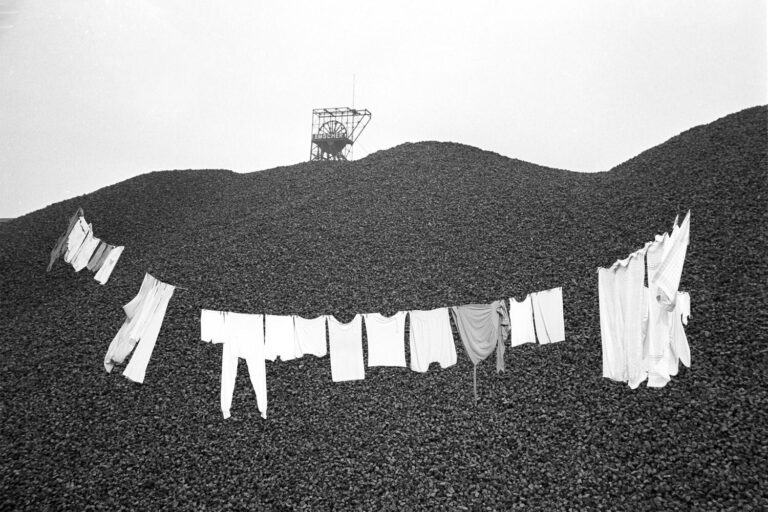Pınar Öğrenci
Glück auf in Deutschland
Opening – 26 APR 2024, 6-9 pm
Galerie Tanja Wagner is pleased to present Glück auf in Deutschland, our first solo exhibition by Pınar Öğrenci.

Pınar Öğrenci
Photography collage
2024
collage work produced with archival photographs taken from the Ruhr Museum
Courtesy of the artist and Galerie Tanja Wagner, Berlin
Glück auf is a greeting used in the Ruhr region, the old center of German coal mining, to wish luck to the miners, ensuring they return from the pit profitably and safely. The video, photographic and collage works shown in the exhibition, include visual materials from private and public archives. Using photographs taken in the region between 1950 and 1990, Pınar Öğrenci explores the politics of the body and architecture in the mining industry and transformation of mining buildings, the construction of a German national miners’ identity, the invisible labor and struggles of women, the lack of representation of migrant workers, and racist practices in the health and insurance system in the Ruhr area.
Through her collage works produced with archival photographs taken from the Ruhr Museum, she questions the conjoined relationship between migrant labor, factory space, industrial landscape, and the worker’s body in the Ruhr region, the heart of German industry. In a five-channel video work, the iconic traditional miners’ song Glück auf, der Steiger kommt is whistled by Turkish and Kurdish women from the region. In light of the rise of the far right and recent threats to migrants in Germany, the exhibition wishes good luck to those seeking freedom in this country amidst the risks and challenges this entails.
The exhibition takes its title from the self-organized exhibition Glück auf in Deutschland by migrant miners from Turkey at LWL-Landeshaus in Münster in 2017. Works in the exhibition are produced within the framework of the exhibition Die Verhältnisse zum Tanzen bringen – 50 Jahre Kemnade International in coordination with the Kunstmuseum Bochum from Apr 27 – Sep 08, 2024.
Artist and filmmaker Pınar Öğrenci’s films and installations deal with displacement, migration, survival, and resistance. Her works are driven by difficult, everyday struggles; the stories she hears, observes, experiences, collects, and documents from different geographies. In earlier works, Öğrenci explored the rarely-spoken stories of migrant communities around the Mediterranean, the Aegean, and in Berlin. Her film Aşît – The Avalanche gained international attention during documenta fifteen.
She has a background in architecture, which informs her poetic, atmospheric, and experiential video-based works and site specific installations that accumulate traces of ‘material culture’ related to forced displacement. Her works are decolonial and feminist readings from the intersections of social, political, and anthropological research, everyday practices, and human stories that follow agents of forced migration.
Pınar Öğrenci was born 1973 in Van, Turkey and currently lives and works in Berlin. She was awarded with the Villa Romana Preis 2022 and nominated for Böttcher Strasse Kunst Preis 2022 in Bremen. Her works will be included in upcoming exhibitions at Disobedience Archive, Venice Biennial, Biennale Matter of Art Prag, and Fraq Bretagne in Rennes in 2024.
Selected exhibitions: Her works has been exhibited nationally and internationally at group exhibitions including documenta fifteen, Kassel, MAXXI Museum, Rome, 12th Gwangju Biennial, 6th Athens Biennial, the Istanbul off-site project of Sharjah Biennial13, Kunsthalle Bremen, SALT Galata, İstanbul and many others.
Solo exhibitions: Berlinische Galerie, Berlin, Hundertwasser Museum Kunst Haus Wien, Tensta Konsthall, Stockholm and Depo İstanbul. Selected screenings: Neue Nationalgalerie, Berlin, Schirn, Frankfurt, Brücke Museum Berlin, Protocinema, New York, Kunst Meran, Merano, İstanbul Modern, Architecture Centre Museum Quarter, Vienna and Maxim Gorki Theater Berlin.
Selected screenings: Neue Nationalgalerie, Berlin, Schirn, Frankfurt, Brücke Museum Berlin, Protocinema, New York, Kunst Meran, Merano, İstanbul Modern, Architecture Centre Museum Quarter, Vienna and Maxim Gorki Theater Berlin.
